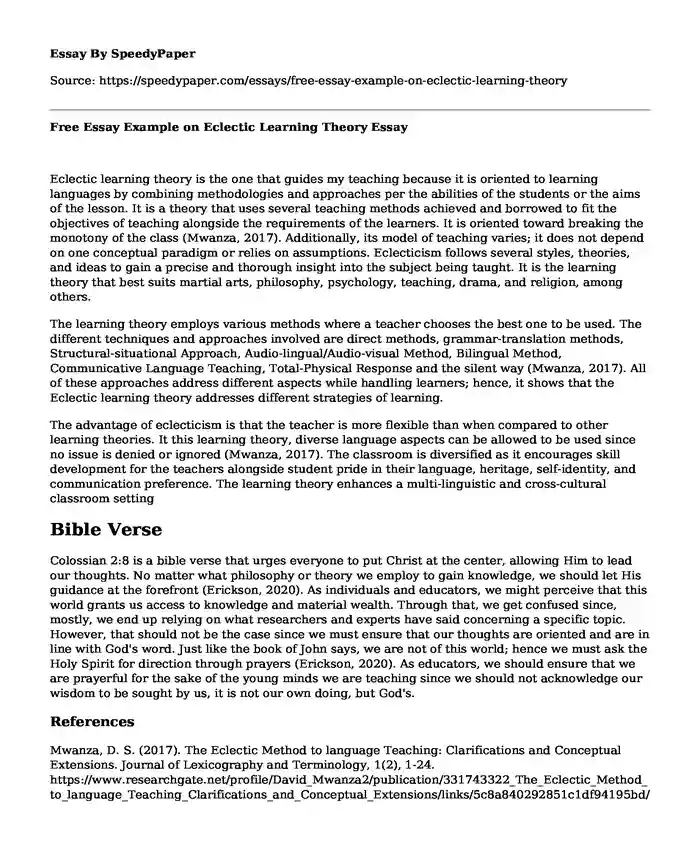Eclectic learning theory is the one that guides my teaching because it is oriented to learning languages by combining methodologies and approaches per the abilities of the students or the aims of the lesson. It is a theory that uses several teaching methods achieved and borrowed to fit the objectives of teaching alongside the requirements of the learners. It is oriented toward breaking the monotony of the class (Mwanza, 2017). Additionally, its model of teaching varies; it does not depend on one conceptual paradigm or relies on assumptions. Eclecticism follows several styles, theories, and ideas to gain a precise and thorough insight into the subject being taught. It is the learning theory that best suits martial arts, philosophy, psychology, teaching, drama, and religion, among others.
The learning theory employs various methods where a teacher chooses the best one to be used. The different techniques and approaches involved are direct methods, grammar-translation methods, Structural-situational Approach, Audio-lingual/Audio-visual Method, Bilingual Method, Communicative Language Teaching, Total-Physical Response and the silent way (Mwanza, 2017). All of these approaches address different aspects while handling learners; hence, it shows that the Eclectic learning theory addresses different strategies of learning.
The advantage of eclecticism is that the teacher is more flexible than when compared to other learning theories. It this learning theory, diverse language aspects can be allowed to be used since no issue is denied or ignored (Mwanza, 2017). The classroom is diversified as it encourages skill development for the teachers alongside student pride in their language, heritage, self-identity, and communication preference. The learning theory enhances a multi-linguistic and cross-cultural classroom setting
Bible Verse
Colossian 2:8 is a bible verse that urges everyone to put Christ at the center, allowing Him to lead our thoughts. No matter what philosophy or theory we employ to gain knowledge, we should let His guidance at the forefront (Erickson, 2020). As individuals and educators, we might perceive that this world grants us access to knowledge and material wealth. Through that, we get confused since, mostly, we end up relying on what researchers and experts have said concerning a specific topic. However, that should not be the case since we must ensure that our thoughts are oriented and are in line with God's word. Just like the book of John says, we are not of this world; hence we must ask the Holy Spirit for direction through prayers (Erickson, 2020). As educators, we should ensure that we are prayerful for the sake of the young minds we are teaching since we should not acknowledge our wisdom to be sought by us, it is not our own doing, but God's.
References
Mwanza, D. S. (2017). The Eclectic Method to language Teaching: Clarifications and Conceptual Extensions. Journal of Lexicography and Terminology, 1(2), 1-24. https://www.researchgate.net/profile/David_Mwanza2/publication/331743322_The_Eclectic_Method_to_language_Teaching_Clarifications_and_Conceptual_Extensions/links/5c8a840292851c1df94195bd/The-Eclectic-Method-to-language-Teaching-Clarifications-and-Conceptual-Extensions.pdf
Erickson, A. J. (2020). Scripture Index. In Ephraim Radner, Hosean Wilderness, and the Church in the Post-Christendom West. Brill. https://brill.com/view/book/9789004420212/back-2.xml
Cite this page
Free Essay Example on Eclectic Learning Theory. (2023, Nov 12). Retrieved from https://speedypaper.net/essays/free-essay-example-on-eclectic-learning-theory
Request Removal
If you are the original author of this essay and no longer wish to have it published on the SpeedyPaper website, please click below to request its removal:
- Essay Example: Best Learning Methods for Medicine Students
- Free Essay: Foreign Language Classes Should Not Be Mandatory in Colleges
- Free Essay: The Inception of the New Curriculum
- Essay Example: Mission, Interviews, and Orientation
- Essay Sample on Kurt Lewin's Fundamental Equation
- Paper Example. Personal Statement for Master of Social Work (MSW)
- Learning and the Grading System - Essay Sample
Popular categories





